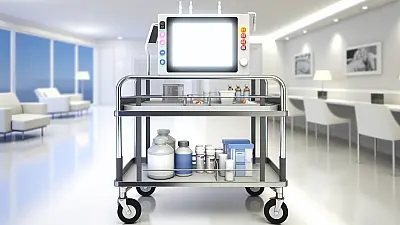LOS ANGELES, CA - Federal inspectors documented multiple safety violations and a critical feeding tube incident at Westwood Post Acute Care during an April 2025 inspection, raising concerns about resident safety and proper medical care at the Santa Monica Boulevard facility.

Feeding Tube Disconnected, Nutrition Formula Spilled on Floor
The most serious violation occurred when nursing staff discovered a resident's feeding tube had become disconnected from their gastrostomy tube, causing liquid nutrition to flow onto the floor instead of reaching the patient. The incident involved a resident with cognitive impairment who depends entirely on tube feeding for nutrition due to cerebral vascular accident (stroke), generalized weakness, and diabetes.
During the April 1st inspection, surveyors observed the feeding tube connection device lying on the floor while the pump continued running, spilling Glucerna formula that should have been delivering 75 milliliters per hour directly into the resident's stomach. The Licensed Vocational Nurse on duty confirmed the serious nature of the malfunction.
Medical protocols require tube feeding systems to remain as closed units to prevent bacterial contamination. When feeding tubes become disconnected, residents face immediate risks including malnutrition, dehydration, and potential infections from exposure to airborne bacteria. For patients dependent on tube feeding as their sole source of nutrition, even brief interruptions can lead to dangerous blood sugar fluctuations, particularly concerning for diabetic residents.
The resident's physician had ordered twice-daily feedings of Glucerna 1.5, a specialized formula designed for diabetic patients. When this nutrition source is interrupted, blood glucose levels can become unstable, potentially leading to dangerous hypoglycemic episodes. Additionally, medications administered through feeding tubes may not be properly absorbed when the stomach is empty, compromising treatment effectiveness.
Room Safety Hazards Left Unaddressed
Inspectors also identified multiple safety hazards in resident living areas that had persisted despite resident complaints. In one room, surveyors found a television mounted with loose screws that caused it to tilt dangerously, creating a potential falling hazard. The resident reported that the TV "looks like it might fall to the floor" and was tilted so severely it could not be properly viewed.
Window blinds in the same room were found in significant disrepair, with broken slats and the top portion bent and detached from wall fixtures. The resident expressed concern that the damaged blinds "may fall to the floor at any time."
Federal regulations require nursing homes to maintain safe, hazard-free environments for residents. Loose fixtures and damaged equipment pose serious injury risks, particularly for elderly residents who may have mobility limitations or cognitive impairments that prevent them from quickly moving away from falling objects.
During the inspection, the Maintenance Supervisor acknowledged the problems and stated repairs would be completed. However, the presence of these hazards suggests inadequate routine safety inspections and delayed response to resident concerns about environmental dangers.
Medical Records Privacy Violation
The facility also violated federal privacy laws by allowing unauthorized personnel to access and retain confidential medical records. Inspectors found that a liaison had improper access to patient-identifiable information, representing a breach of Health Insurance Portability and Accountability Act (HIPAA) privacy standards.
HIPAA regulations strictly limit access to medical records to authorized healthcare personnel directly involved in patient care. When unauthorized individuals access protected health information, it violates patient privacy rights and can expose sensitive medical details to inappropriate parties. Healthcare facilities must implement robust access controls and regular auditing to ensure compliance with federal privacy requirements.
This type of violation indicates potential weaknesses in the facility's information management systems and staff training on privacy protocols. Proper medical record security requires both technological safeguards and comprehensive staff education about confidentiality requirements.
Industry Standards and Required Protocols
Federal nursing home regulations establish clear standards for the violations identified at Westwood Post Acute Care. Regarding tube feeding, facilities must ensure proper administration of enteral nutrition according to physician orders, with staff trained to maintain sterile technique and secure connections.
For environmental safety, regulations require facilities to maintain buildings and equipment in good repair, free from hazards that could cause resident injury. Regular maintenance inspections should identify and address potential dangers before they pose risks to resident safety.
Medical record privacy requires comprehensive policies limiting access to authorized personnel only, with audit trails documenting who accesses patient information and when. Staff must receive regular training on HIPAA compliance and privacy protection protocols.
Additional Issues Identified
The inspection also documented policy and procedure deficiencies related to maintenance services and resident room standards. Facility policies dating to 2012 require maintaining buildings, grounds, and equipment "in safe and operable manner at all times" and providing residents with "a safe, clean, comfortable, and homelike environment."
The combination of violations suggests systemic issues with safety oversight, staff training, and quality assurance processes. While the facility's Maintenance Supervisor indicated repairs would be completed, the persistence of known hazards raises questions about the effectiveness of routine safety monitoring.
All violations were classified as having "minimal harm or potential for actual harm" affecting few residents. However, the feeding tube incident represents a particularly serious lapse in medical care that could have resulted in significant health consequences for a vulnerable resident dependent on artificial nutrition.
The facility has been required to submit a plan of correction addressing each identified deficiency. Federal regulations mandate that nursing homes correct violations promptly and implement measures to prevent recurrence, with follow-up inspections to verify compliance.
Full Inspection Report
The details above represent a summary of key findings. View the complete inspection report for Westwood Post Acute Care from 2025-04-04 including all violations, facility responses, and corrective action plans.
💬 Join the Discussion
Comments are moderated. Please keep discussions respectful and relevant to nursing home care quality.